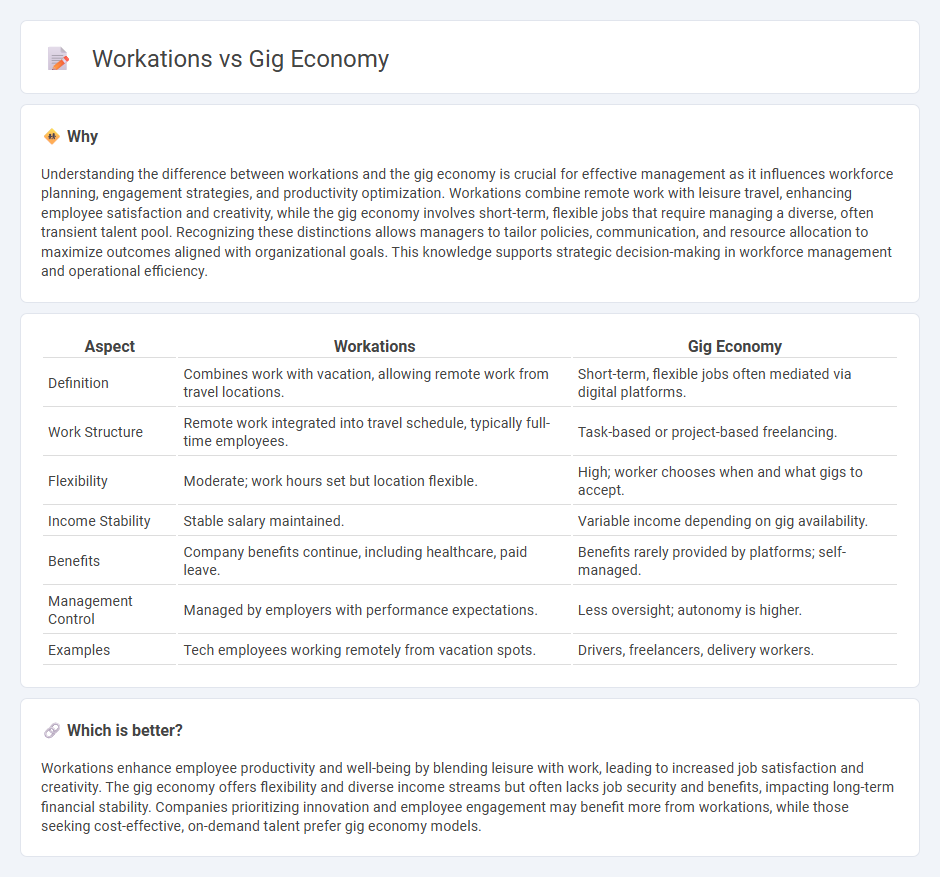
Workations blend remote work with travel, offering flexibility and enhanced productivity for professionals seeking a change of environment. The gig economy emphasizes short-term, freelance contracts, enabling workers to diversify income sources and cultivate specialized skills. Explore the distinct management strategies that optimize performance and satisfaction in both workations and the gig economy.
Why it is important
Understanding the difference between workations and the gig economy is crucial for effective management as it influences workforce planning, engagement strategies, and productivity optimization. Workations combine remote work with leisure travel, enhancing employee satisfaction and creativity, while the gig economy involves short-term, flexible jobs that require managing a diverse, often transient talent pool. Recognizing these distinctions allows managers to tailor policies, communication, and resource allocation to maximize outcomes aligned with organizational goals. This knowledge supports strategic decision-making in workforce management and operational efficiency.
Comparison Table
| Aspect | Workations | Gig Economy |
|---|---|---|
| Definition | Combines work with vacation, allowing remote work from travel locations. | Short-term, flexible jobs often mediated via digital platforms. |
| Work Structure | Remote work integrated into travel schedule, typically full-time employees. | Task-based or project-based freelancing. |
| Flexibility | Moderate; work hours set but location flexible. | High; worker chooses when and what gigs to accept. |
| Income Stability | Stable salary maintained. | Variable income depending on gig availability. |
| Benefits | Company benefits continue, including healthcare, paid leave. | Benefits rarely provided by platforms; self-managed. |
| Management Control | Managed by employers with performance expectations. | Less oversight; autonomy is higher. |
| Examples | Tech employees working remotely from vacation spots. | Drivers, freelancers, delivery workers. |
Which is better?
Workations enhance employee productivity and well-being by blending leisure with work, leading to increased job satisfaction and creativity. The gig economy offers flexibility and diverse income streams but often lacks job security and benefits, impacting long-term financial stability. Companies prioritizing innovation and employee engagement may benefit more from workations, while those seeking cost-effective, on-demand talent prefer gig economy models.
Connection
Workations blend remote work with travel, enabling gig economy workers to leverage flexible schedules and diverse locations for increased productivity and creativity. The gig economy's reliance on digital platforms facilitates seamless project management and client communication during workations. This synergy enhances work-life balance while driving innovation and economic participation in transient, location-independent roles.
Key Terms
Flexibility
The gig economy offers unmatched flexibility by allowing workers to choose projects and set their own hours, ideal for those seeking autonomy over their schedules. Workations combine remote work with travel, providing flexibility in both location and routine, enhancing work-life balance through new environments. Explore how these flexible work models can transform your professional and personal life.
Remote Work
The gig economy offers flexible, short-term contracts ideal for freelancers and independent workers seeking remote opportunities. Workations combine remote work with travel, allowing employees to maintain productivity while exploring new locations. Explore how these models reshape remote work and enhance work-life balance.
Autonomy
The gig economy offers unprecedented autonomy by allowing individuals to choose when, where, and how they work, fostering flexibility and self-management. Workations combine remote work with travel, enhancing autonomy by integrating leisure and productivity in diverse environments. Discover how these models redefine work-life balance and empower personal freedom.
Source and External Links
Gig Economy - Overview, Advantages, Disadvantages - This webpage provides an overview of the gig economy, including its operations, advantages, and disadvantages for both businesses and workers.
The Pros and Cons of the Gig Economy - This article explores the gig economy's growth and its implications for workers and businesses, highlighting both benefits and drawbacks.
What is the Gig Economy? - This definition explains how the gig economy operates through temporary positions and digital platforms, connecting customers with independent workers.
 dowidth.com
dowidth.com